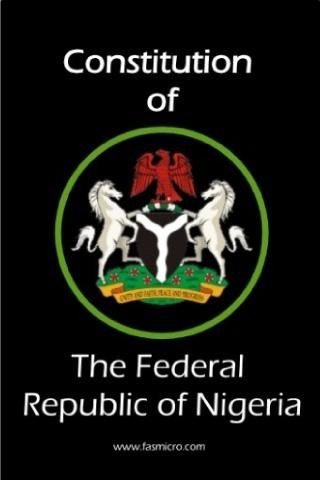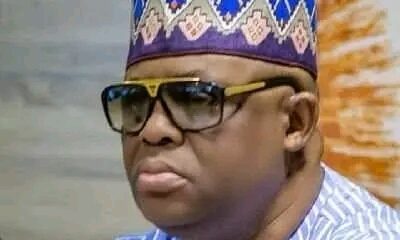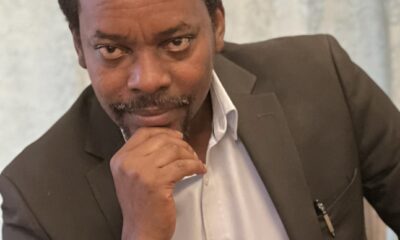National Issues
The lure of constitutional and electoral design -By Festus Okoye


I have maintained and will continue to maintain that for us to sustain the gains of the 2015 elections and improve on it during the 2019 general elections; we must begin now to plan and prepare for it. Part of the planning and preparation must involve the institution of credible constitutional and electoral framework for the conduct of the said elections.
This means that the Independent National Electoral Commission, civil society groups, political parties and other critical stakeholders in the electoral process must begin early consultation, networking and analysis on what has been done, what has been left undone and what needs to be done in the constitutional and electoral framework of Nigeria.
But why is it that since 1999 we have been in the vicious web of electoral and constitutional reform and design? Why is it that we must always wait till elections are around the corner before embarking on the process of constitutional alteration and Electoral Act amendment? Why has it been difficult to carry out fundamental constitutional alteration and amendment to the Electoral Act that will be substantial, effective, sustainable, enduring and less controversial? Why have we been in these issues for too long and more or less going in circles?
As my friend Udo Jude Ilo of the Open Society Initiative for West Africa posited in a programme organized by a civil society organization, RECLAIMNAIJA “there are fundamental gaps in the way we have approached reform of the electoral process which makes it difficult for us to achieve substantial change that will make our electoral system sophisticated enough to protect the peoples mandate, limit the possibilities of manipulations by politicians and reduce the instability risk factors associated with elections”.
But the truth of the matter is that the way we have handled issues around constitutional alteration and the reform of the electoral framework for the conduct of elections is consistent with our approach to serious national issues and challenges. Sometimes we find it difficult to confront and deal with issues that need sheer political will and conviction. Sometimes, we create institutions, assign roles and functions to them and yet find it difficult to submit our constitutional and legal problems to the interpretative and adjudicatory jurisdiction of such institutions.
We go in cycles and pretend that all is well. But that is typical of the way we do things. Unfortunately, the moment a law is passed and policies and decisions are put in place, some of our compatriots move in to undermine the laws, policies and decisions. Sometimes, they move ahead of the law makers.
They think ahead, imagine the next move by civil society groups and other reformists and put in place means and mechanisms to undermine them. To some of these people free, fair and transparent elections are anathema to their physiology and psychology and must be undermined.
Some of them cannot contemplate even remotely mounting the soap box to canvass for votes. It is not part of their psychological makeup. To some of them, it is more convenient to hire, drug and pay some skull crackers to create a state of mayhem around the polling units and scare away the voters and carry the ballot box and ballot papers. Some of them train their own Presiding Officers and use them to doctor and or fill fake result sheets.
They do all these because they are afraid of the people and the power of the vote. But that is just part of the challenge. The point is that we can conduct credible elections with the present constitutional and legal framework. We can tame electoral fraudsters with the faithful implementation of the provisions of the constitution and the Electoral Act, 2010(as amended). Unfortunately, regulatory agencies created to regulate and ensure proper conduct and behaviors are in need of regulation.
The enforcement agencies created and empowered to enforce the due observance of the law are also in need of monitoring and policing and the Nigerian people are left vulnerable in an electoral heist. Rather than confront the weaknesses of our regulatory agencies and our lack of political will to submit to the rule of law and due process we run to redesign the constitution and the Electoral Act anytime we run into a cul-de-sac. Rather than carry out fundamental constitutional alteration and amendment to the law, we approach the exercise half heartedly. We make cosmetic and episodic alterations to aspects of the constitution with electoral flavour and return to the constitution for more alterations at the slightest sign of trouble.
We aborted and rendered inchoate the 4th alteration to the Constitution that had more substance. I may not be totally correct on the 4th alteration to the Constitution as speculations are rife that the former President of the Federal Republic of Nigeria Goodluck Jonathan assented to it before he left office. But that is at the realm of speculation.
Alteration to the fundamental law of the land cannot be reduced to market place gossip and speculation. The last I heard of the alteration was when the Supreme Court advised the Executive and the 7th Assembly to settle out of Court. But we have been on the road of constitutional alteration since 1999.
On October 19, 1999 the Government set up the Presidential Technical Committee on the Review of the 1999 Constitution which received memoranda from the public, organized public hearings and submitted its report to the government in February 2001.
The government processed the report into A Bill for An Act to provide for the Amendment of the Constitution of the Federal Republic of Nigeria; 1999 and for Purposes Connected Thereto.” This Bill expired with the life of the National Assembly in 2003.
The National Assembly again on the 30th day of October 2003 set up its own Joint Committee on the Review of the 1999 Constitution. Unfortunately, the joint committee could not fly as the Government thwarted their efforts due to lack of funds. On the 21st day of February 2005 the Federal Government set up the National Political Reform Conference. The question of revenue allocation, sincerity of the government and attempts to smuggle in a third term in office for the President bogged down the proceedings of the Conference.
In September 2005, the National Assembly presented for first reading The Constitution of the Federal Republic of Nigeria 1999(Amendment) Bill, 2006. The Bill remained still born until the life of the Assembly expired in 2007. In 2007, the Federal Government set up the Electoral Reform Committee which made far reaching recommendations on amending aspects of the provisions of the Constitution of the Federal Republic of Nigeria with bearing on the electoral process. The report of the Committee is still subject to debates and contestation.
In 2014 the Federal Government set up the 2014 National Conference. The report of the Conference should be somewhere. Of course we have had successful alterations to the Constitution. We had the Constitution of the Federal Republic of Nigeria (First Alteration) Act, 2010 which was signed by the Clerk to the National Assembly on the 6th day of January, 2011 and assented to by the President on the 16th day of January, 2011.
The alteration placed INEC on the 1st charge, dealt with the issue of determination of four year tenure in cases of electoral misdemeanor and provided timelines for the resolution of post election disputes. We had the Constitution of the Federal Republic of Nigeria (Second Alteration) Act, 2010 which among other things provided for new timelines for the conduct of national elections by the Independent National Electoral Commission.
The Constitution of the Federal Republic of Nigeria (Third Alteration) Act, 2010 was passed by the Senate of the Federal Republic of Nigeria on the 14th day of December, 2010 and by the House of Representatives on the 15th December, 2010 and receipts of approval by the State Houses of Assembly on the 8th February, 2010. It was signed by the Clerk to the National Assembly on the 22nd day of February, 2011 and assented to by the President of the Federal Republic of Nigeria on the 4th day of March, 2011.
The Constitution of the Federal Republic of Nigeria (Third Alteration) Act, 2010 further alters the Constitution of the Federal Republic of Nigeria to make for the establishment of the National Industrial Court as a superior Court of Record in Nigeria.
Furthermore, the Electoral Act has gone through half hearted amendments. We amended it in 2002, 2006, and 2010 and again in 2010. Yet we still have the Electoral Act Amendment Bill still hanging in the balance. There is also speculation that the President assented to it and yet no one has seen a copy.
I agree that society is dynamic and “there is no Constitution that is perfect even if an autochthonous Constitution like ours. I also agree that “the fact that our Organic Law by its nature is indigenous does not mean that the wise men and women who framed it are vested with omnipotence of God or vested with the ability to take care of all possible eventualities.”
Yet we must not be slavish to constitutional alterations and legal amendments. We have invested so much time and resources altering the Constitution and amending the Electoral Act that it has become cyclical and slavish and yielding little returns. We must aim at fundamental alterations and amendment to the Constitution and the Electoral Act and abandon the cosmetic approach. While aiming at the fundamentals, we must empower our regulatory and enforcement agencies, submit to the rule of law and due process and imbibe the culture of civility.

















